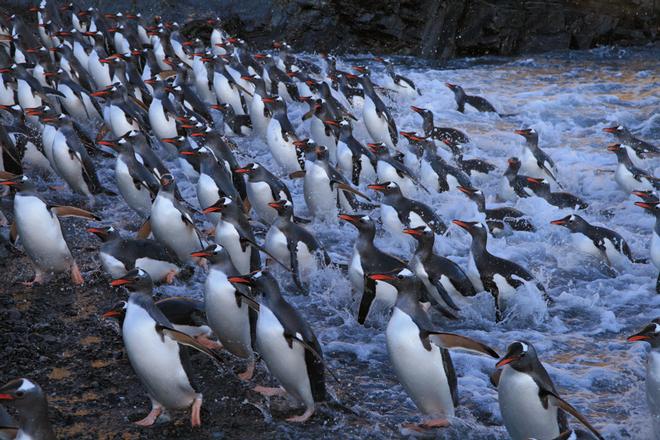BAS charts rise and fall of prehistoric penguin populations
by British Antarctic Survey on 15 Jun 2014

Gentoo penguins coming ashore at Bird Island. Ewan Edwards, British Antarctic Survey
The British Antarctic Survey has been involved in a study of how penguin populations have changed over the last 30,000 years. This study has shown that between the last ice age and up to around 1,000 years ago penguin populations benefitted from climate warming and retreating ice. This suggests that recent declines in penguins may be because ice is now retreating too far or too fast.
The international team, led by scientists from the Universities of Southampton and Oxford, used a genetic technique to estimate when current genetic diversity arose in penguins and to recreate past population sizes. Looking at the 30,000 years before human activity impacted the climate, as Antarctica gradually warmed, they found that three species of penguin; Chinstrap, Adélie and southern populations of Gentoo penguins increased in numbers. In contrast, Gentoo penguins on the Falkland Islands were relatively stable, as they were not affected by large changes in ice extent.
A report of the research is published in the journal Scientific Reports.
Lead author, Gemma Clucas, from Ocean and Earth Sciences at the University of Southampton comments:
'Whereas we typically think of penguins as relying on ice, this research shows that during the last ice age there was probably too much ice around Antarctica to support the large populations we see today. The penguins we studied need ice-free ground to breed on and they need to be able to access the ocean to feed. The extensive ice-sheets and sea ice around Antarctica would have made it inhospitable for them.
'What is particularly interesting is that after the ice age, all of these penguin populations were climate change ‘winners’, that is to say the warming climate allowed them to expand and increase in number. However, this is not the pattern we’re seeing today. Adélie and Chinstrap penguins appear to be declining due to climate change around the Antarctic Peninsula, so they’ve become ‘losers’. Only the Gentoo penguin has continued to be a ‘winner’ and is expanding its range southward.'
Dr Tom Hart of the University of Oxford’s Department of Zoology, an author of the paper, continues:
'We are not saying that today’s warming climate is good for penguins, in fact the current decline of some penguin species suggests that the warming climate has gone too far for most penguins.
'What we have found is that over the last 30,000 years different penguin species have responded very differently to a gradually warming world, not something we might expect given the damage current rapid warming seems to be doing to penguins’ prospects.'
Co-author Michael Dunn from the British Antarctic Survey explains:
'Understanding the historical responses of these penguin populations on a regional scale provides a useful context with which we can compare the current population changes taking place in the Scotia Arc. We show that although changes in the size and range of penguin populations in this region isn't new, and is in fact taking place today, the gradual warming of the past led to increases in those penguin populations whereas during today's more rapid warming several species are actually in decline.'
To estimate changes in penguin genetic diversity, the researchers collected feathers and blood samples from 537 penguins in colonies around the Antarctic Peninsula. The scientists then sequenced a region of mitochondrial DNA that evolves relatively quickly. Using the rate of mutation of this region of DNA as a calibration point, the researchers were able to chart how the size of these populations has varied over time. The team working on the project included scientists from the British Antarctic Survey and also US scientists from Oceanites Inc, Woods Hole Oceanographic Institution, and the University of North Carolina, Wilmington.
'During the last ice age Antarctica was encircled by 100 per cent more winter sea ice than today,' says Dr Tom Hart. 'As ice retreated, these penguins had access to more breeding sites and more open ocean to feed.'
Gemma Clucas, who is based at the National Oceanography Centre, Southampton, says:
'Despite historic warming clearly opening up new opportunities for penguins, we should not assume that current rapid warming caused by human activity is good for penguins as a whole. Evidence from other studies shows that climate change today is creating lots of losers and few winners – with chinstrap and Adélie populations around the Antarctic Peninsula declining fast. This is probably as a result of reductions in sea ice causing stocks of the krill they feed on to shrink, whilst populations of Gentoo penguins, which don’t rely on krill as much, grow and expand.'
If you want to link to this article then please use this URL: www.sail-world.com/123348